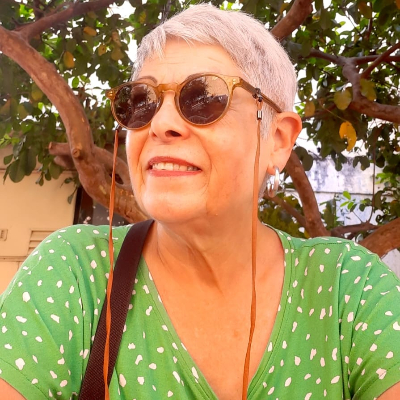Editor’s Note: We feature this text in English translation and in the original Portuguese. Scroll down to read in English, and click “Español” to read in Portuguese.
I’ve been indoors for two weeks now. I haven’t been out more than two or three times, and every time to do something no one else in the house does: go to the bakery, the supermarket, or the pharmacy. What has struck me the most is the fear I feel of people. I’ve never felt this way before. I’ve feared people in other ways. I’ve been afraid of my father’s violence, of the violence of being mugged, of domestic violence. I’ve been afraid of talking, of physical and moral pain, I’ve been afraid of being judged for this or that, afraid of an examination board, of what they would say about my performance, afraid of a rude boss, but I’ve never been afraid of people and their skin, their hands, their sneezes, their coming too close to me, of when they hand me a basket with milk, a loaf of bread, a flower, some books, some keys, a payment terminal. I’ve been experiencing this and also so much sorrow… that I worry I’ll never overcome such feelings. I’m afraid that from now on, this virus may turn out to be a ghost that will follow people throughout their lives. This has caused me agony and made me feel like I’ll never [want to] go out again.
I keep thinking of the pain those who suffer from very contagious diseases experience, those patients who had to be isolated from other people, who were hospitalized to die, who couldn’t see anybody. Dead from diseases that combine pain and loneliness, not to mention prejudice. Sick people that no one wants to touch, see, or get close to. I asked a nurse assistant a question, and she stepped back. I went to meet the postman at the gate and hesitated to take the pen he was extending to me in a gloved hand; after signing for the delivery, I started to feel my hands burn, though that wasn’t it; I went to a grocery store with reasonably wide aisles to buy rice and tomatoes, and we all walked there avoiding each other like magnets of the same pole, like a detouring dance, like a game of invisible fences. One step forward from me, a step back from someone else. What if someone sneezed there? I was afraid it might cause a lynching. Things I’ve never thought of before.
This is another point, my friend: I don’t like going out. For years, I’ve suffered anytime I need to go out to work, go on trips (also for work, before science was practically cancelled in the country, and long before the virus), go to parties, do anything. I use an abridged calendar where I mark all the activities in small squares, each completely written and scribbled on. I cross out the days that go by like prisoners in the movies. I like the days that go by as if I were going to arrive at a better time, I don’t know. Nothing tells me that, but I hope; I don’t know. And in these small squares, I write my appointments with acronyms in fine print with abbreviations. I mark those I managed to accomplish, without further ado. But the blank days, when I have no appointments, those days that seem to be mine, are the ones I love the most. I protect them like a threatened lioness, but not always successfully. I protect them from a bombing, a flood, or an attack. It always annoys me how others make use of my time. Always. And for years, I’ve been trying to move along this calendar, as if in a chess game that I don’t know how to play or always lose. Also, I keep looking at the months to come and thinking of the blank days, which in fact are those when people let me take care of myself, my stuff, my preferences, my sleep, my books, my writing. Can you understand me? Can you write during this confinement? If we have days to stay at home, why has writing become a little difficult? Have you been feeling the fear and stress of the problem overwhelming your home and soul? Have you been feeling you are in the world, even if you wish to be in a book yet to be written? Have you been feeling that the World Health Organization has a lot to do with your plans and verses? Have you been feeling that humankind is only one, even though it is hard for me to believe that some of my species are really human? Have you been feeling disgusted with some politicians and businessmen more than usual? Have you been wishing that the virus would be intelligent when selecting who it is going to infect, though you know this is just a delirium of terror?
During these confinement days, I haven’t felt the difficulty of those who like to be on the street, the more sociable ones, the younger, those who go out in search of a bar or party. I don’t feel particularly imprisoned. But something distracts and annoys me a lot, in a very different way than when I simply want my home. It’s fear. The fear of going out, if I want to or have to; the fear of the delivery people; the fear of something I can’t see and don’t even know if it is near; and the precarious freedom of those who are pressed by the State. It’s different, my friend, when you can or can’t choose.
I’ve been hearing about Brasilia. The news coming from there used to be about certain issues, but now it’s about different ones. The disease is there, just like it’s here. I watch TV and notice how the characters’ faces have changed. Some of them start to appear more often, with their jargon that pertains to other fields (of knowledge), words we generally don’t hear [on the news]. Some topics have disappeared, others have emerged, and another topic occupies almost everything. I can’t even stay in front of the screen for a long time because the fear of a TV transmission starts to be part of my imagination. Imagine a digital virus, a transmissible virus among people who see each other through the screens, a virus that would exterminate humankind as we know it. Perhaps this virus circulating now has already done it.
I’ve heard and read optimistic projections about what we are going to learn once this bizarre situation is over. I couldn’t feel optimistic, not even with the very well-articulated points made by honorable analysts and commentators. I don’t know if we can learn anything good from this situation. Have we ever been worse than we are now? Or is this our usual arrogance? I’ve read a text written by an expert, one of those with a Ph.D. from I don’t know where, a CNPq grant recipient, etc. In the text, he pointed to a few things that this pandemic shows or was supposed to show us humans: how we are intertwined, those who own things and those who don’t; and how the common good is above what we think to be personal. It was beautiful to read it. It was great. I might have spent some ten minutes there, in a kind of oasis. Below the text, however, were comments from over fifty inexcusable people. For the most part, people who distill hate, idiocy, violence, scorn for others, etc., etc. Those things we know quite well. They are sick.
Thus my fear. A continuous fear, even being confined, in the safety of my home—which has water, soap, food, loved and loving people, a shower and cosiness. Fear of what we already were, which discouraged me so much from interacting with people in general; fear of what we are and what we’ll be again. In particular, when I listen to hateful businessmen’s audios, more despicable than other human beings that they despise (their employees, their servants?), I have small surges of desire to erase the world, without any suffering, with a single keyboard key, ctrl+z, undo, it’s not just erase, it’s undo.
Pessimistic? I don’t want my letter to reach you with so much bitterness. It’s a confession, more than a transmission. Today, I sent messages to some very beloved people. Audio and text messages, people whom I worry about, people I would like to help or simply find out how they are doing: two relatives with whom I’m more in tune or for whom I have a sense of fraternity; a really scared friend, of course, who is abroad and trying to come back; a friend who tested positive for HIV. I felt a certain sadness in all of them. From those who answered me with audio messages, I listened to their melancholic, almost dragging voices, as if doubting that one day we could come back to our usual hugging. Do you miss hugging, Rosangela?
I grew up in a family with few displays of this kind of affection. I grew up without being touched much. To this day, we hug each other shyly, half sideways, without looking at each other. I learned how to hug at school when friendships took the form of selective kinship. As a matter of fact, some friends from that time are in my life to this day (I’ve just sent a message to one of them, for example). But hugging and kissing have always demanded some sort of effort. Fear? But once I’ve learned it, it’s hard to undo. I have been greeting my son using my feet and elbows, even my son (!) who is the only being on this Earth whose skin and fluids have always seemed mine, who was never difficult to hug, who makes me feel the pain of this unprecedented detachment.
Rosangela, have we been banned by a disease? Do you talk to plants? Pets? Do you meet your friends on a video call? Do you feel like the future days of your calendar are fading away, fraying, blurring? Have you ever experienced something like that? And still, have you had to deal with the human imbecility in egocentric neighbors, well-known financiers, under the threat of those who infect us with both ignorance and the virus at the same time?
Tell me about you, my dear friend; about Brasília; about some dystopic novel that is occupying your mind—yours or someone else’s; about your sleep during these days of weirdness; your desires for after this pandemic is over; your hopes, better than mine; your arrangements for the future after nature puts us in our rightful place.
Greetings with my elbows, in an aseptic letter
Ana Elisa Ribeiro
Translated by Anita Di Marco
Note: Rosangela is a writer from Belo Horizonte. This piece was commissioned by Revista Pessoa when the author worked there as a columnist, and it was also published in the book Nossa Língua & Outras encrencas by Parabola, 2023.
The translator thanks the literary translator and writer, Cristina Pinto-Bailey, for helping her with the final editing.



